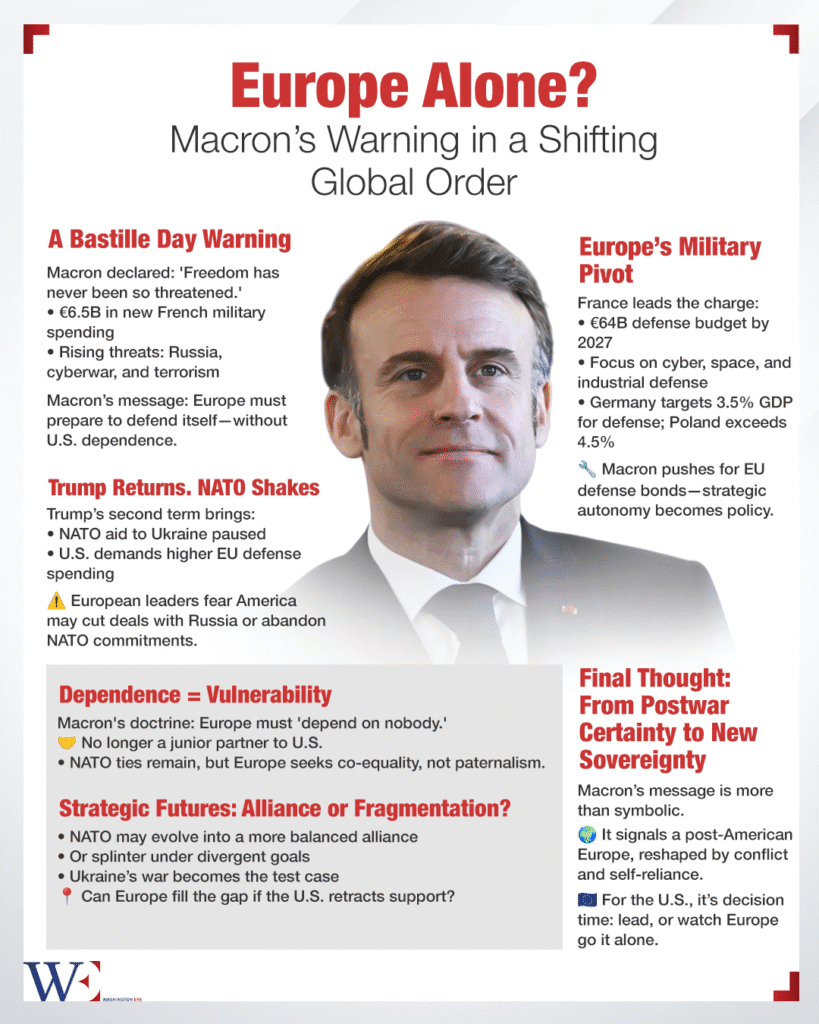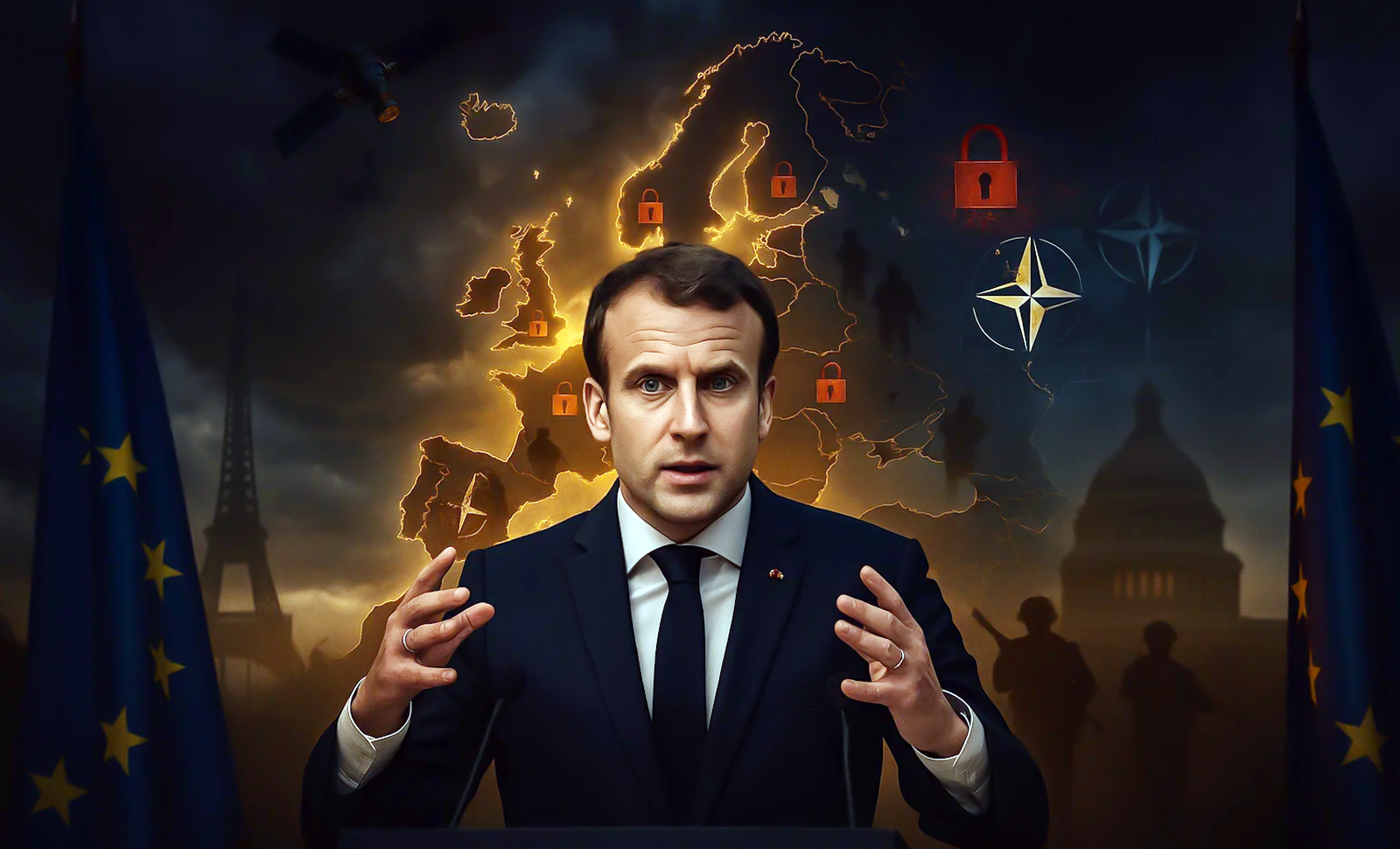French President Emmanuel Macron’s Bastille Day address this year was no ordinary ceremonial reflection. Instead, he issued a stark warning: Europe is facing its “greatest threat” to freedom since the end of World War II. Framing this moment as a geopolitical inflection point, Macron unveiled an aggressive plan to inject €6.5 billion in new military spending over the next two years. “Freedom has never been so threatened”, Macron declared, referencing intensifying Russian aggression, cyber warfare, terrorism, and the volatility of Europe’s eastern flank.
What elevated Macron’s message beyond domestic policy, however, was its unmistakable subtext: Europe must prepare to defend itself, increasingly without relying on the United States.
Trump’s Return and Europe’s Strategic Anxiety
Macron’s comments land at a moment of transatlantic unease. Since Donald Trump’s return to the White House in January 2025, longstanding NATO commitments have been under strain. President Trump has repeatedly signaled that he expects European nations to “pay their fair share” or risk diminished U.S. support for NATO operations, a position consistent with his first term but now backed with real administrative teeth. Already, the Trump administration has paused key military aid packages to Ukraine pending “burden-sharing reviews”, and floated the idea of conditional support based on NATO countries’ defense spending benchmarks, according to BBC.
This has stoked fears in European capitals that the U.S. could withdraw from its leadership role in NATO—or worse, strike a geopolitical bargain with Russia. Macron’s speech must be read in this context: not only a response to threats from Moscow, but also to the growing unpredictability from Washington.
Recalibrating Defense: Europe’s Financial and Strategic Pivot
France’s increased military investment is part of a broader continental shift. Germany is now targeting 3.5% of its GDP for defense by 2028, while Poland has surpassed 4.5%. Macron, ever the proponent of “strategic autonomy”, is also pushing for EU-level defense bonds to support common procurement and innovation—an initiative reminiscent of pandemic-era joint borrowing. But it’s not just about money; it’s about signaling independence.
France’s planned €64 billion defense budget by 2027 will be its highest since the Cold War. New investments are directed toward cyber warfare, space-based capabilities, and revitalizing industrial defense supply chains. Macron’s push for greater Franco-British nuclear collaboration adds another layer of deterrence, suggesting Europe is preparing for high-end conflict scenarios in which American leadership may be absent or constrained.
Macron’s Strategic Vision: Dependence is the New Vulnerability
Macron’s rhetoric is intentionally blunt. Speaking just days before the NATO summit in Washington, he stressed that Europe must “depend on nobody”—a clear repudiation of overreliance on the United States. The Trump administration’s transactional approach to alliances has revived Macron’s long-standing belief that Europe cannot be secure unless it is sovereign.
This isn’t an abandonment of the United States as a partner; it’s a redefinition. Macron sees a future in which Europe must be a full co-equal—not a junior partner dependent on the temperament of American electoral cycles. His administration remains engaged with the U.S. on Ukraine, tech cooperation, and NATO defense planning. But the French President is increasingly insistent that these ties must be based on mutual reliability, not paternalism.
Implications for the Transatlantic Future
NATO’s Evolution or Fragmentation: If Europe successfully strengthens its own defense posture, NATO may evolve into a more balanced alliance—one no longer centered solely on Washington. But if Trump further erodes the alliance’s consensus or credibility, NATO could fracture under the weight of divergent strategic priorities.
Ukraine’s Future as Litmus Test: Macron has tethered European security directly to the outcome of the war in Ukraine. Trump’s wavering support risks creating a vacuum that Europe may not yet be institutionally equipped to fill, potentially prolonging conflict or undermining diplomatic leverage with Moscow.
U.S.-EU Relations Enter a New Phase: Trump’s America is less interested in alliance maintenance and more focused on bilateral, deal-based diplomacy. Europe’s response—particularly France’s—suggests the EU will no longer be content to play defense under an American umbrella, especially when that umbrella may be retracted at any moment.
A Final Note: Between History and Realignment
Macron’s urgent warning that Europe’s freedom is under the gravest threat since 1945 is not hyperbole—it is a recognition of a world reshaped by authoritarian resurgence, war on the continent, and the unreliability of former certainties. In the short term, Europe must close ranks, bolster military resilience, and invest politically in the idea of self-sufficiency.
For the United States under President Trump, the choices are equally stark: recommit to transatlantic leadership in a meaningful, dependable way—or risk presiding over the quiet unraveling of a postwar order that once anchored global stability.

















